Two and a half days, 25 bowls of noodles, one esophagus on fire.
It is afternoon when I eat my first bowl of spicy noodles with Li Jieping in Chongqing, the hilly metropolis straddling China’s Yangtze River. The city’s noodles, called xiaomian (little noodles), are considered a breakfast food, so Li has already eaten and is anxious to get to the park to drink tea. “If you don’t start your day with a bowl of noodles, then your day hasn’t really started,” intones an article in Bite of Chongqing, a local food magazine, whose latest cover story is, yet again, about xiaomian.
Li, a soft-spoken, chain-smoking, bald man who is pushing 50, sports a round belly that is apparent in his preferred wardrobe: an oversized t-shirt and jean shorts. He is the self-proclaimed Number One Expert on Chongqing noodles. Nobody challenges him for the title. Chongqing Morning Paper crowned him the “Number One Noodle Obsessive” in 2014; a year earlier, when he appeared as the main character in a documentary about Chongqing noodles, he became a small-time local celebrity. I address him formally as Mr. Li, but he instructs me to call him “Brother Lamp,” a version of his online moniker, 123Lamp, which he uses on WeChat and Weibo, China’s two major social media networks.
I am sweating profusely from the noodles despite the unseasonably cool weather outside. As I eat, Brother Lamp’s mind is elsewhere. He lifts his metal-frame glasses off of his eyes, resting them on his forehead as he brings his phone close to his face and scrolls through his social media accounts. He carries a large camera bag slung over his shoulder; he brings the bag wherever he goes, but only once pulls out his camera. The rest of the time it serves as an oversized holder for cigarettes, a constant presence in his hand.
Brother Lamp suggests I add a little vinegar to the broth and drink it. This is the first time I have drank a hot, steaming bowl of oil, but, it turns out, it will not be the last. I take a sip and sneeze violently until the spice settles angrily in my stomach. I am starting to understand Brother Lamp’s impatience: at this moment, with my esophagus slightly on fire, there is nothing I want to do more than sit in a park and drink tea.
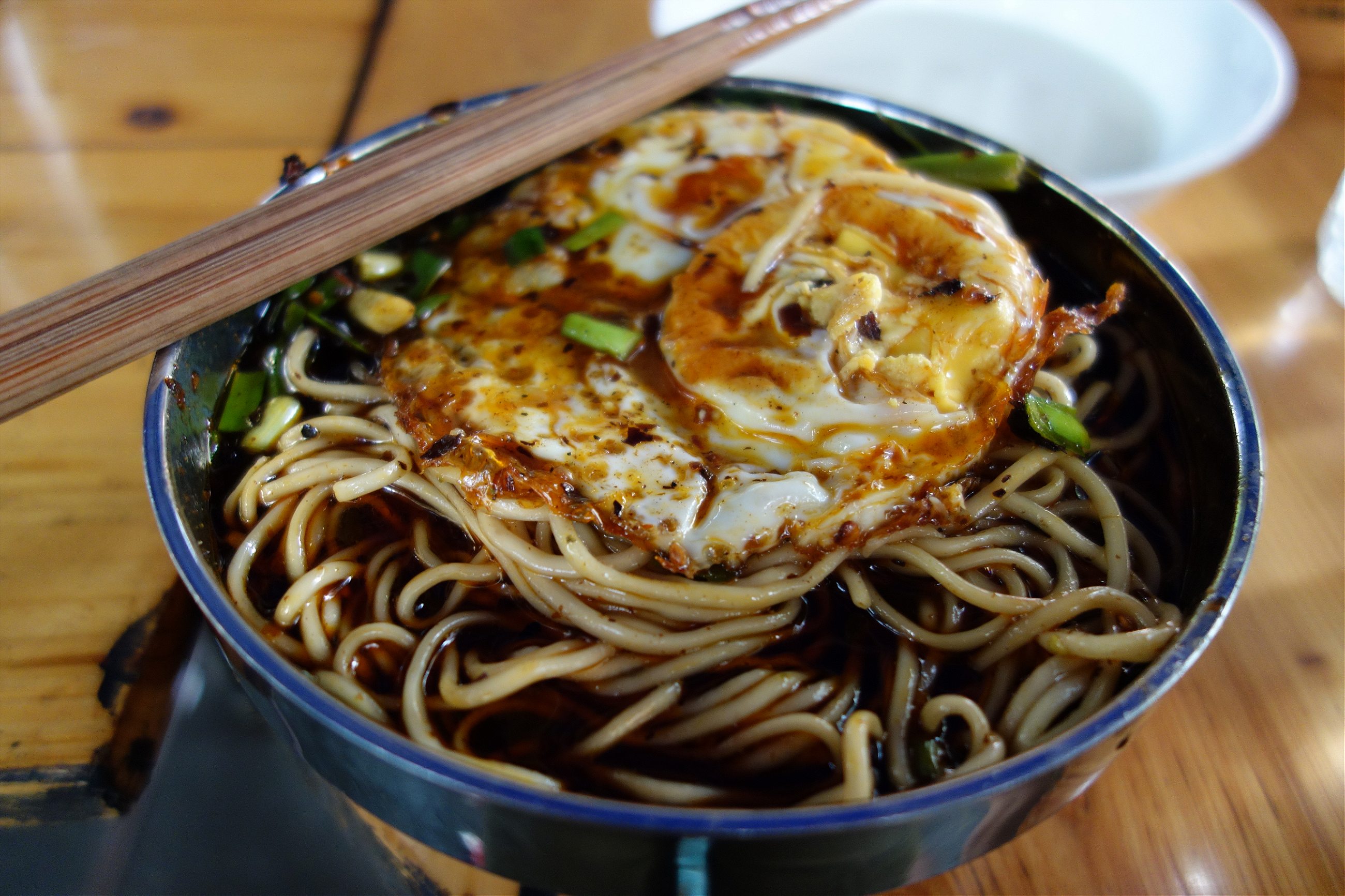
In the last three years, more than 3,000 people have come to meet Brother Lamp in the park to drink tea and talk about noodles. He remembers them all. He meets most of his friends online: the internet has connected him to people around the world who are also obsessed with xiaomian. “It is noodle fate,” he says.
It is already apparent that I am more of a noodle novice than a noodle obsessive. Lounging in the park, Brother Lamp details the categories of Chongqing noodles. Xiaomian describes all varieties of the thin, wheat noodles found in Chongqing, where it is classified as a staple food, not a snack, because of its historically central role in the local diet. I try to steer the conversation toward other topics, like current affairs, but Brother Lamp only wants to talk about xiaomian. “I don’t pay attention to politics. What’s the use? I pay attention to noodles, and that’s enough.”
An elderly woman carrying two large baskets on a pole over her shoulders sets up shop in the broad plaza of the park. She is selling tofu covered in Chongqing spices. Brother Lamp suggests I get one, and insists on paying for me. “How’d you pick the name 123Lamp?” I ask him as I eat.
“When I first got the internet, I needed a username but couldn’t think of one.”
“Did you just see a lamp on your desk and use that?” I joke.
He laughs and nods sheepishly. What had been a poorly planned screen name for the uncharted online world is now his main identity. He lives with one foot in Chongqing, and one foot on the web, on social media. In both places, xiaomian dominates.
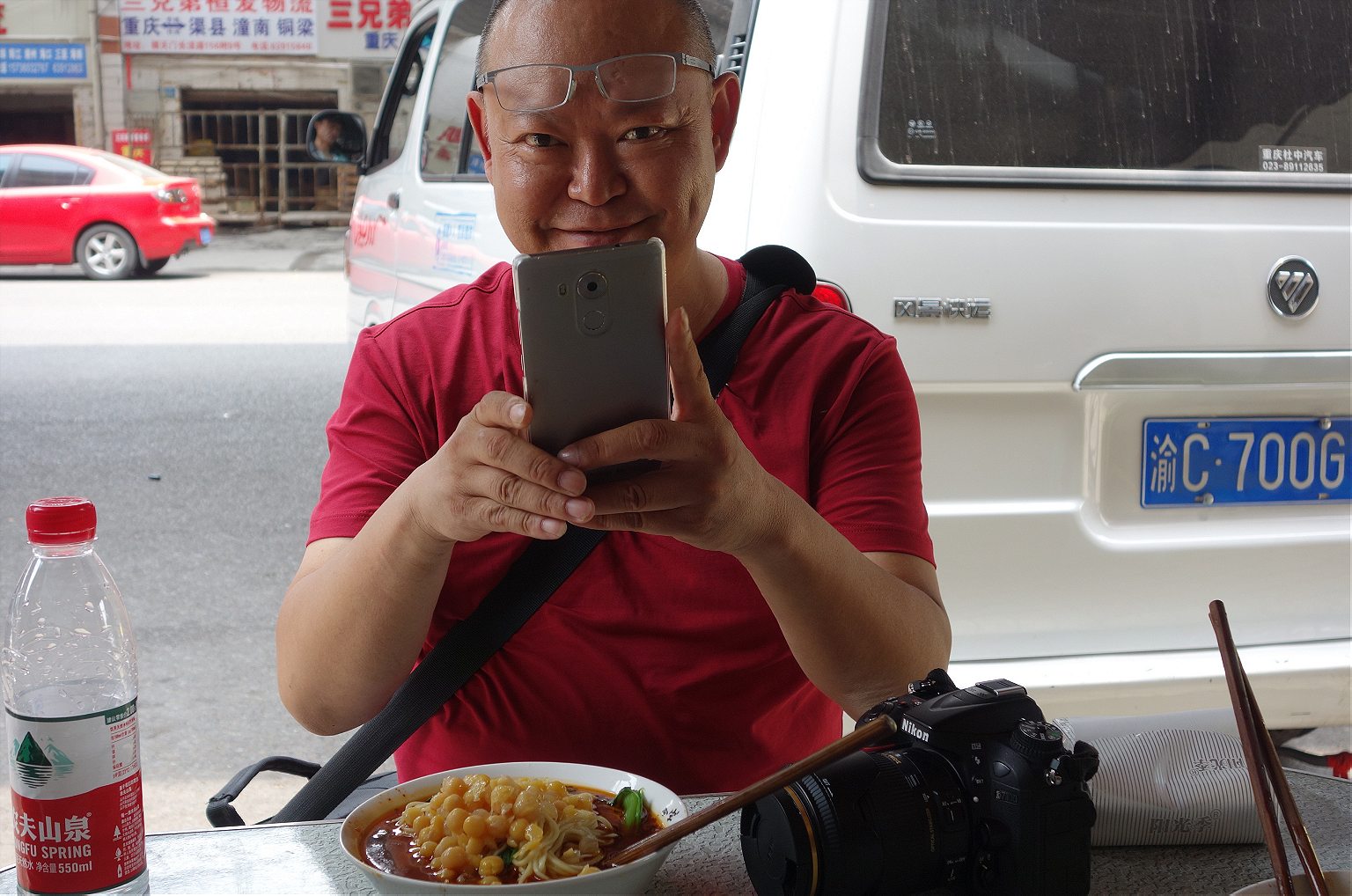
Chongqing is world-famous as a food mecca, but few people associate the city with noodles: it is recognized for its hotpot, drowning in chili peppers.
Yet for locals, noodles are more intertwined with the pace of daily life. Hotpot is an outlandish, over-the-top orgy of spice: if you eat hotpot one day, you can’t have it the next. Xiaomian is more quotidian, more reliable: it is a common breakfast that unites people across a city that sprawls for hundreds of miles. The noodles come in multiple varieties, based on the same mix of spices and sauces but adorned with different vegetables and meats: my favorite iteration, called wan za mian, is topped with marinated ground meat and beige-colored beans that look, taste, and are prepared exactly like chickpeas but are not, in fact, chickpeas. (It turns out they are yellow peas, which are in the same family of legumes as chickpeas but of a different genus and species. I am a noodle novice.)
“Xiaomian is a window into people’s lives, especially the less privileged who live in Chongqing,” the director of the 2013 documentary on Chongqing noodles, Zeng Lei, says. Noodles connect the vast networks of the Chinese working class in Chongqing, people who are rarely seen in a stratified society that prefers to pay attention to businessmen and celebrities. Everyone has his or her own xiaomian story. “You can’t make a movie about people riding the bus, but you can make one about noodles.”
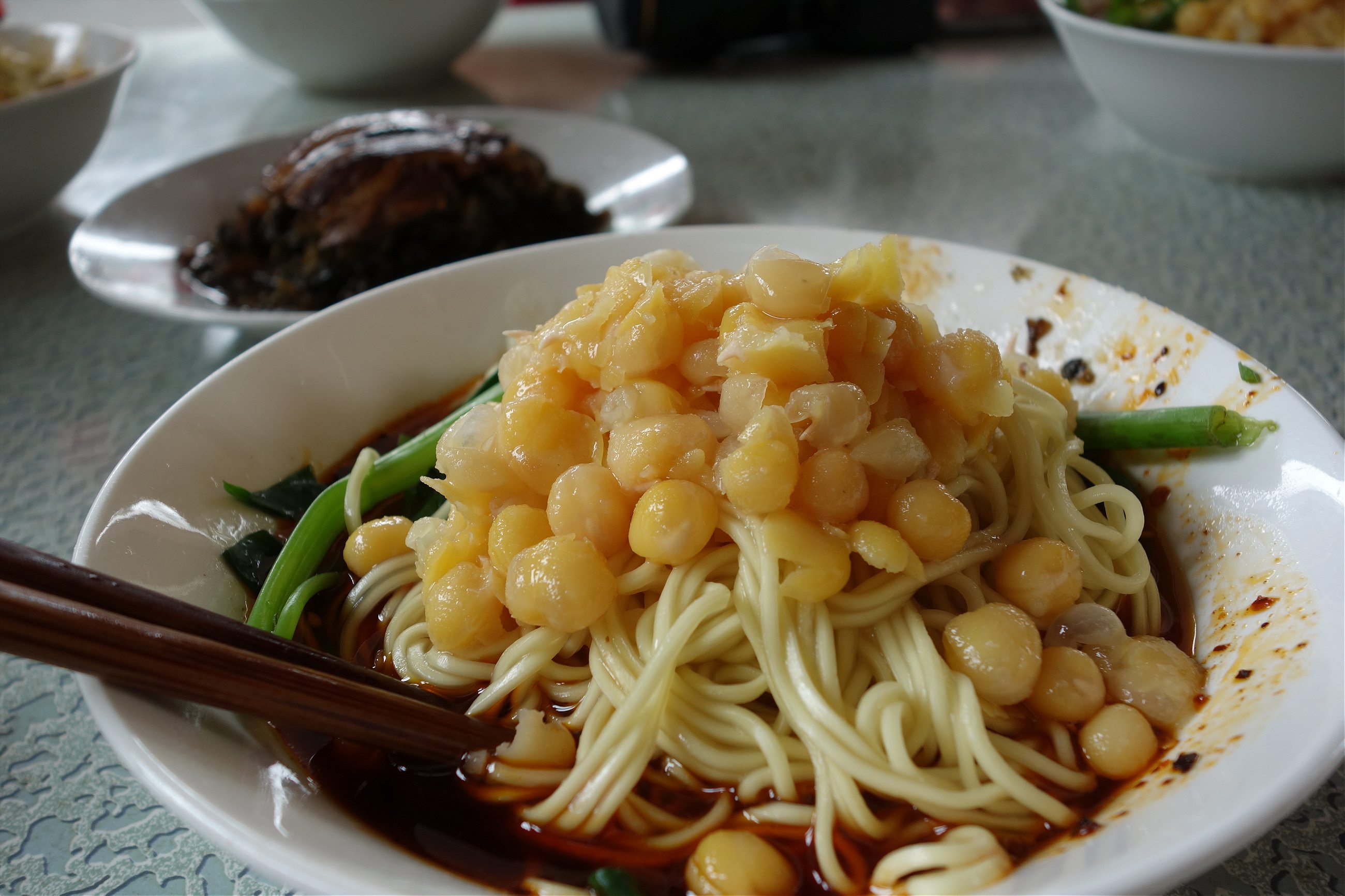
We start our tour the next day, however, in an upscale shopping mall. From the ground floor, we take the elevator up to the third floor and again emerge on ground level; Chongqing is, after all, known for its hills. The empty restaurant is clean and modern, and all of the bowls are emblazoned with the restaurant’s new, more international-friendly logo: a bowl of overflowing noodles and the words “Xiao Mian” spelled out in Romanized letters, rather than Chinese characters. It looks like a fast-casual restaurant or coffee shop you might find anywhere in the world, like a Starbucks.
“The restaurant’s design was inspired by Starbucks,” the owner, Xie Tao, tells me proudly. In just three years, Xie has franchised nearly 200 stores around China and five in Canada, and is now planning to enter the American market.
The restaurant staff emerges from behind the counter with a lineup of variations on traditional xiaomian: pickled cabbage and pork, meatballs in a tomato broth, roasted beef, wan za mian, spicy intestines (version a), and spicy intestines (version b). I take the bowl of wan za mian, and Brother Lamp shows me his five-step process for properly savoring the flavor. He instructs me to taste each ingredient alone: first, the beans; then, the meat sauce; a single, plain noodle; the broth, achieved with the dip of a chopstick; and finally, to mix it all together. A photojournalist from the local paper, invited by Brother Lamp, snaps hundreds of pictures of us in varying stages of noodle consumption. His colleague is going to write an article about me writing an article about noodles. I try to look natural.
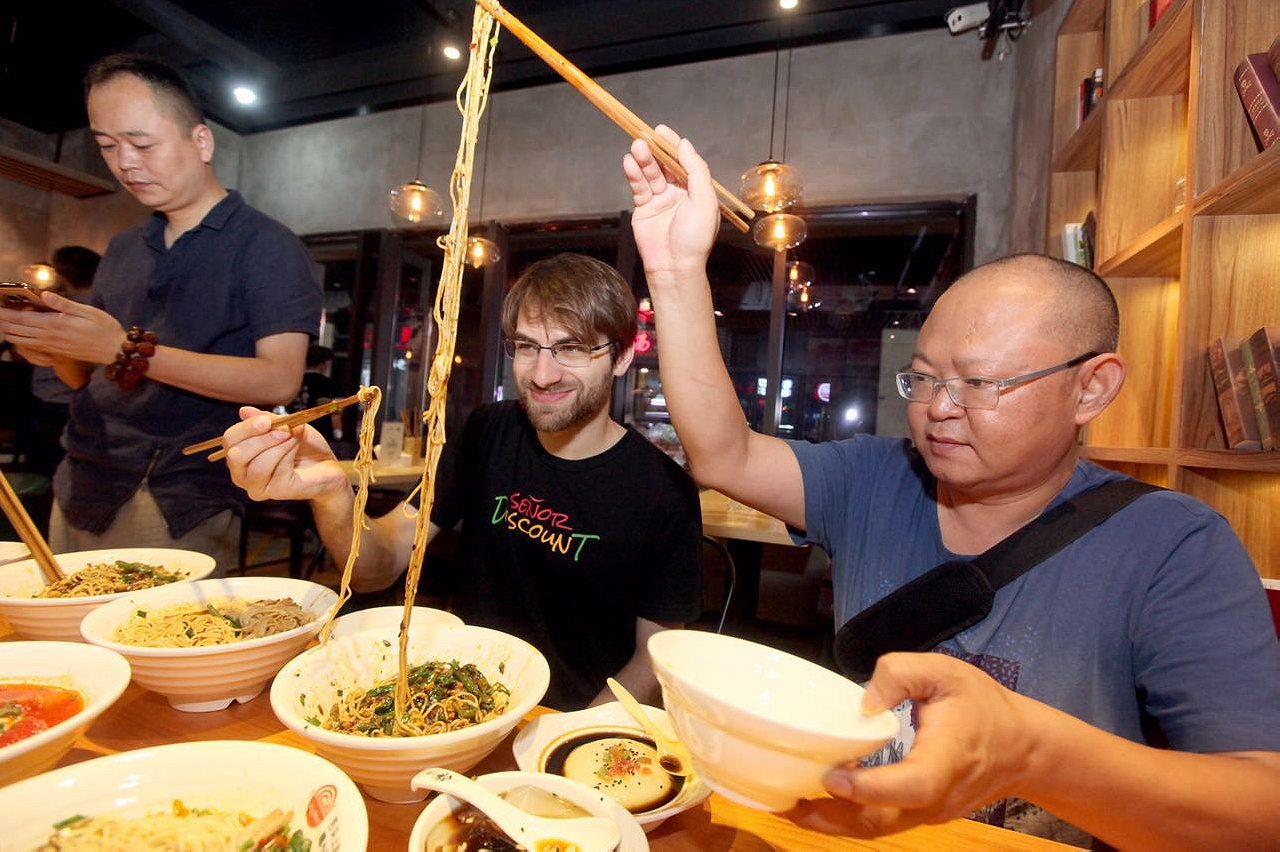
“This restaurant is standardizing xiaomian so it can spread around the world,” Brother Lamp says. Although he is an avowed traditionalist, noodle-wise, he stresses that the internationalized version of xiaomian is neither better nor worse; it is just a more modern version, which can be easily replicated and adapted to the taste buds of a broader audience. It echoes the first of Brother Lamp’s stated goals: spreading Chongqing noodles throughout the country, and possibly the world.
In the kitchen, ingredients are laid out in two rows. With deft flicks of his wrist, Xie Tao goes from left to right on the first row, and then right to left on the second, flipping spoonfuls of each ingredient into one of his branded bowls. Soy sauce, Sichuan peppercorns, MSG, vegetable oil, sesame oil, lard, and more. The last ingredient is perhaps the most important: red chili oil (you la zi). Brother Lamp shops for his peppers at a warehouse downtown devoted entirely to selling hot peppers, located next to the market selling only fruits and the one for household appliances.
With the addition of a large scoop of chili oil and a garnish of fresh spring onions, Xie Tao has prepared a simple, standard bowl of xiaomian in less than a minute.
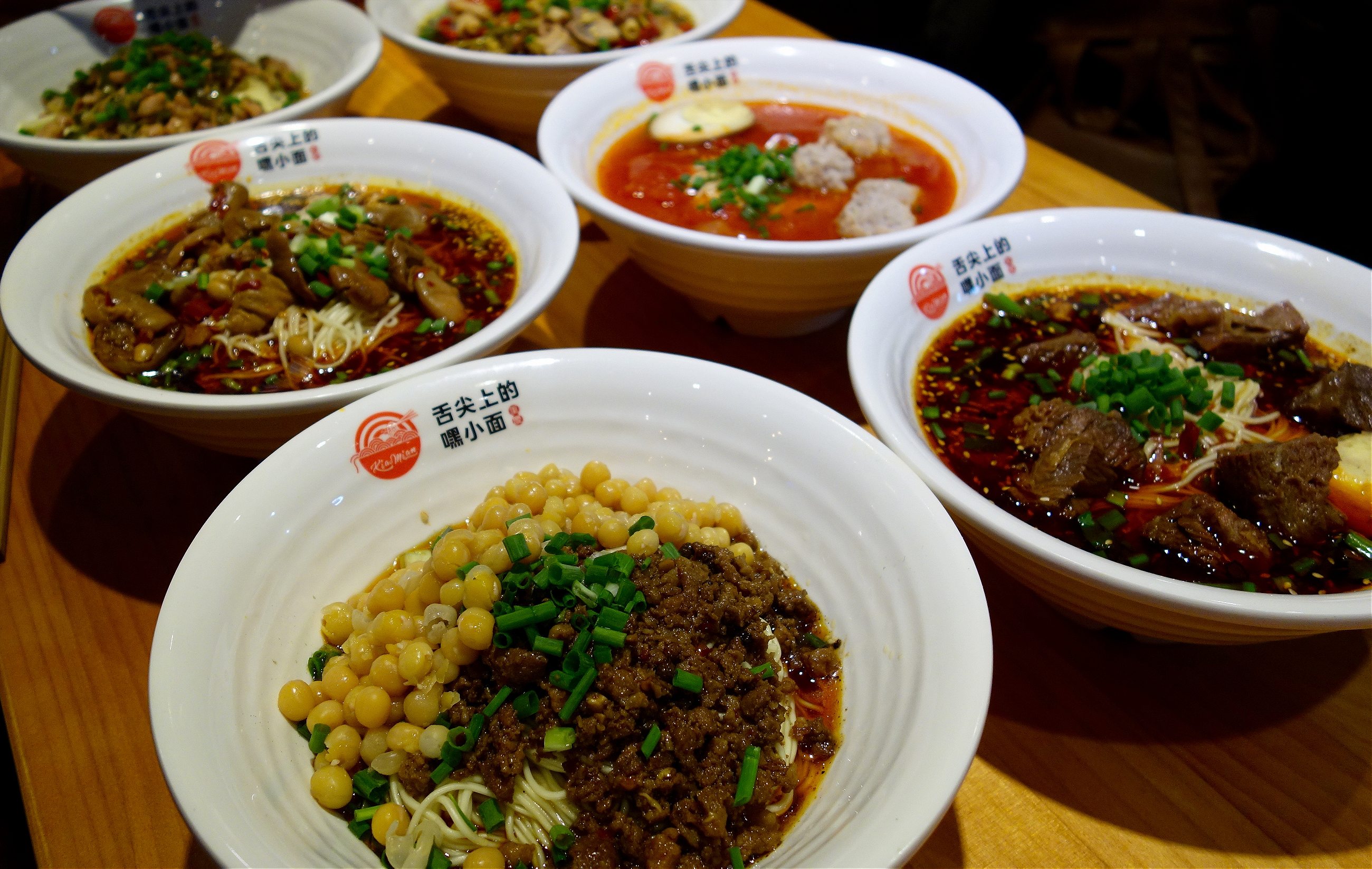
We drive up into the hills, away from the main subway-accessible thoroughfares. I am totally disoriented among the grid-less streets, only able to identify one landmark, a public bathroom shaped like a giant tree trunk, which I spot multiple times through the car window. We park across from a small blue awning with faded letters reading “Zhu Lin Beef Noodles.”
The restaurant’s threadbare metal tables and plastic stools are overflowing with customers. Brother Lamp orders one of everything on the menu. Seemingly running the entire restaurant alone, the woman behind the counter sports a stern, confused look until she recognizes Brother Lamp. Her face lights up; she bubbles with enthusiasm, ushering us to the nearest open table. Moments later, small, heaping bowls of every variety of noodles show up on our table: two of every kind, one made with wheat noodles and one made with rice noodles, like a Sichuan-pepper Noah’s Ark. In addition to what we had previously tasted—beef, intestines, wan za—she also brings a bowl with eel and the most classic version, with no additional toppings except a few sprigs of vegetables.
The woman, Ms. Zhang, sits down at our table, eager to chat, but promptly excuses herself to help a customer. The noodles are light and oily, with very little numbing ma la spice.
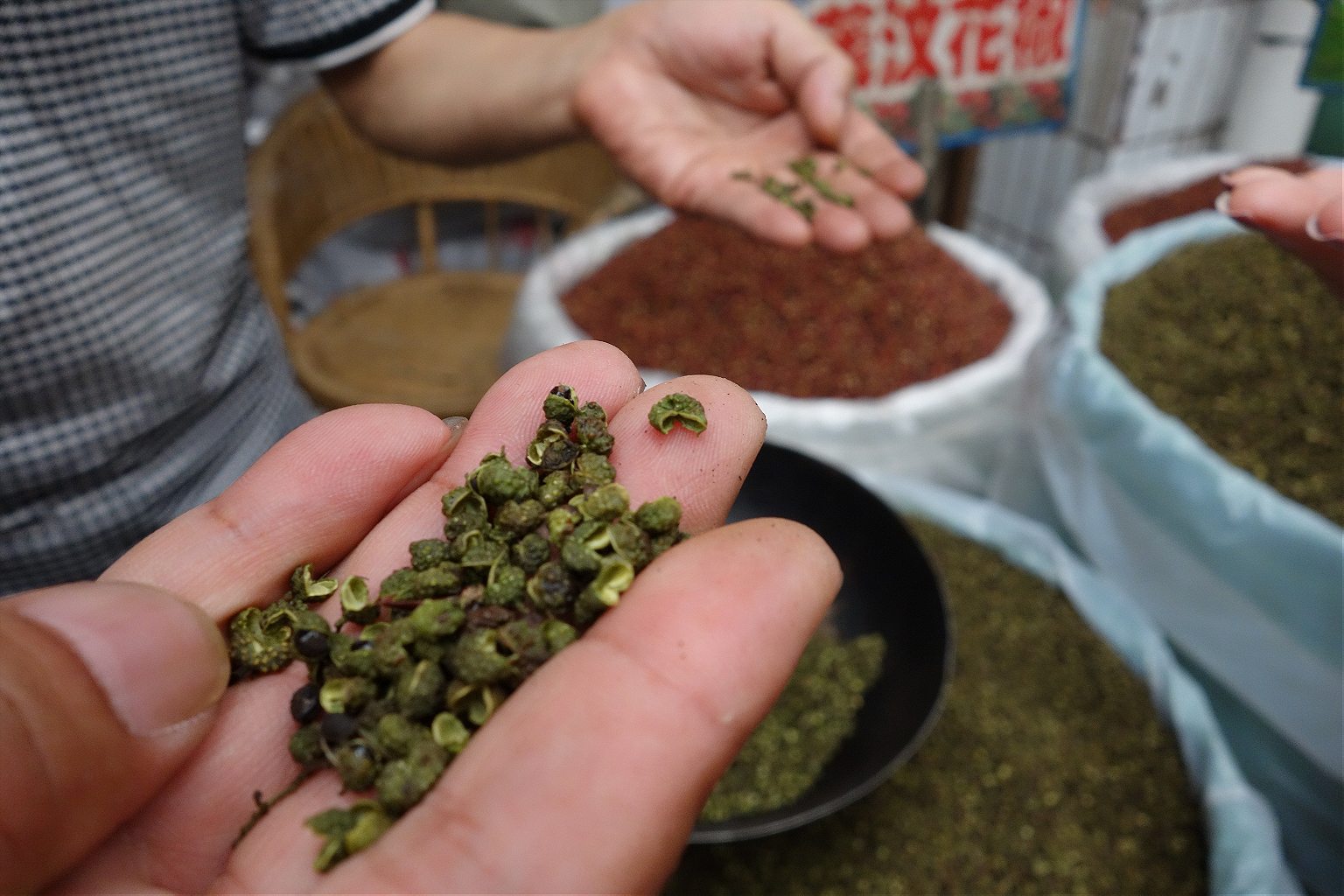
Brother Lamp lifts his glasses onto his forehead, as though he is going to check one of his social media accounts, to analyze the bowls of noodles in front of him. He picks at each bowl with a chopstick and then focuses his efforts on one with spicy intestines. “This restaurant is one of the most reliable,” Lamp says. “If you come back again, the beef broth will be just as good next time.”
Ms. Zhang returns with a plastic straw, draws up another stool to our table, and swiftly excuses herself again to tend to other customers. I stick the straw in a bowl of classic xiaomian, the oily ingredients swirling up around the disturbance. Ms. Zhang is back at our table again. “Be careful, it’s hot,” she warns me.
We have already consumed, at least in part, 16 distinct bowls of noodles in three hours, but who’s counting? My body cannot handle more noodles, yet my brain is intent on trying more. We head toward Er Wa Xiaomian, which is not even a hole-in-the-wall because there is no wall: it is simply a large tent canopy set up in the corner of a parking lot. We pull in just after 1:00 pm, and they are closing down. Their hours are 6:00 am to 1:00 pm. There are no more noodles.
I am both disappointed and relieved.
He has a sensitive tongue for flavor.
Brother Lamp gets up like clockwork at 7:30 a.m. every day. The morning after taking us around Chongqing, he gets up, makes roasted beef, and posts it on his social media feeds, all before I am awake. He usually returns home at midnight or later: when he can’t sleep, he’ll stay up and put his pictures on WeChat and Weibo before eventually going to bed around 2:00 am.
His personal recipe for xiaomian has 17 ingredients; most versions only have 14, because they combine some of them together. “He has a sensitive tongue for flavor,” says his wife, who introduces herself as “Mrs. Lamp.” Six years his junior, the Lamps make perhaps an unlikely pair: she is a thin, fashionable woman with painted-on eyebrows who tries to eat healthily.
Brother Lamp was not always the Number One Chongqing Noodle Obsessive. His father was a watch repairman. At one point, Brother Lamp worked at a camera store; later, he owned a hair salon. He ran a hotpot restaurant for six years in the 1990s, where he met Mrs. Lamp.
His years in the hotpot business taught him to distinguish subtle flavors, but they also spurred his unhealthy habits. Running the restaurant required him to treat his guests to lots of alcohol, and toast alongside them; after a stressful day, he would smoke cigarettes to calm down. Mrs. Lamp has tried many times to get him to stop smoking, but he can’t seem to shake the habit.
We drive toward the center of the city, near the Liberation Monument built to commemorate the Chinese victory over the Japanese in World War II. It is now surrounded by high-end shopping malls featuring stores like Louis Vuitton and Ermenegildo Zegna. We stop at Glasses Beef Noodles, a storefront set back on a small, winding street near a row of stone stairs that dates back to the Ming dynasty. A single bowl costs nearly four dollars, more than twice the price of a bowl anywhere else. The noodles are thick and fluffy, and the soup is as filling and as powerfully spiced as hotpot. It is more expensive, Lamp explains, because the beef is much higher quality, imported from Australia or New Zealand. After one bowl, I am full.
I finish eating, and the Lamps tell me it’s time for lunch. We head down the street for more xiaomian.
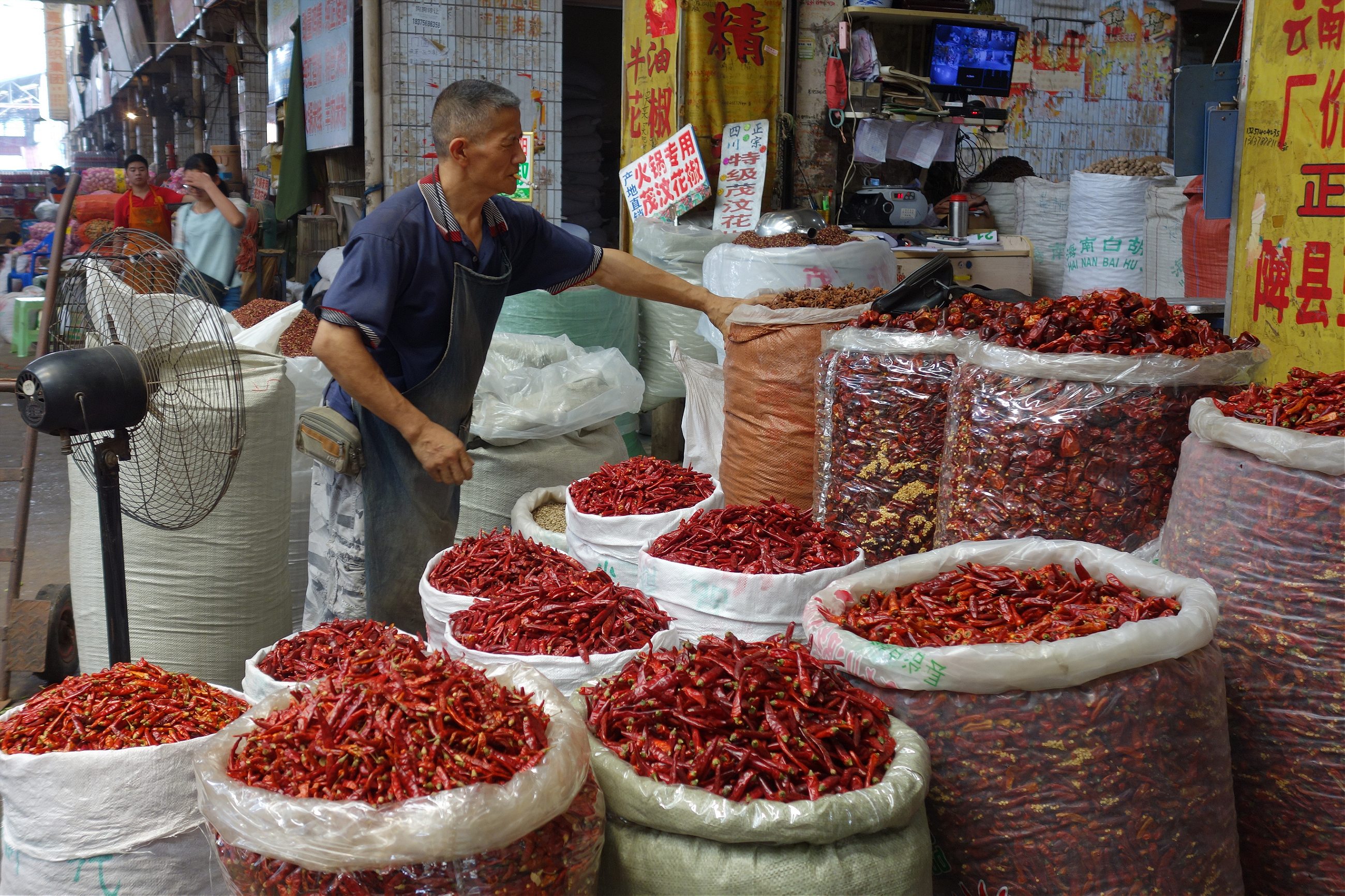
When we meet up later that night for a fried-fish hotpot dinner, Brother Lamp announces that he’s not going to smoke while I’m around so that readers don’t think he smokes too many cigarettes. We sit around a large table of Lamp’s friends and family, all of whom, except his brother and sister-in-law, have some relation to noodles. The others all light up: the air is hazy with cigarette smoke and steaming hotpot spice billowing from the center of the table. A similar haze enshrouds the tables around us.
Lamp steps out to take a call; he returns to tell me it is a reporter for one of China’s national newspapers. The article written about me the day before has been published in the local morning paper, under the headline “American Guy Loves Chongqing Noodles So Much He Flies All the Way to Chongqing to Eat Noodles and Learn About the Ingredients.” Within hours, the article was reposted by the flagship state-run paper, the state newswire, and dozens of aggregators. The article about me writing an article was such a big hit that the national press wanted to redo it for the international edition.
I look around the table, uncomfortable with the attention, thinking about the xiaomian stories that link each person together. Mrs. Lamp and her sister-in-law sit to our right, drinking sugary iced tea and gossiping. Across the simmering hotpot, Ms. Hu and her husband propose a toast to the table. They run a store called Fat Sister’s Noodles, named, they quickly add, after Ms. Hu. They operate the store themselves, with little help, starting before dawn every morning; rarely do they have a free moment to go out and eat with friends. After several rounds of toasting and laughter, Ms. Hu’s cheeks have turned bright red, almost as red as the hotpot broth on the table between us. Brother Lamp sits back, soaking it all in, watching connections borne of noodles grow into friendship and camaraderie. He has started smoking again.
The table collectively gets up and rushes over to the cashier, attempting to pay the check, the ultimate sign of Chinese hospitality for a special occasion like tonight. Only Brother Lamp and I remain seated, knowing our efforts will be in vain. A young instant noodle entrepreneur—a former investment banker— makes a move to pay, but Ms. Hu, beaming, red-faced, and giddy with excitement, slips in at the last moment and pays the bill. “I don’t have a chance to drink very often, so tonight I’m just quite happy,” she says, basking in her dark-horse victory at the counter.
We thank her and go our separate ways. Before the sun rises tomorrow, Ms. Hu and her husband will be back to the daily grind, welcoming hordes of fellow Chongqing workers to a comforting bowl of breakfast noodles. Brother Lamp will stay up late, uploading pictures to his social media account; the next day he will meet with two directors from Shanghai who want to write a musical about Chongqing noodles. My noodle story will come to an end, and I will head back home. For a brief moment, we cross paths. It is noodle fate.
Additional reporting by Yilin Cai.